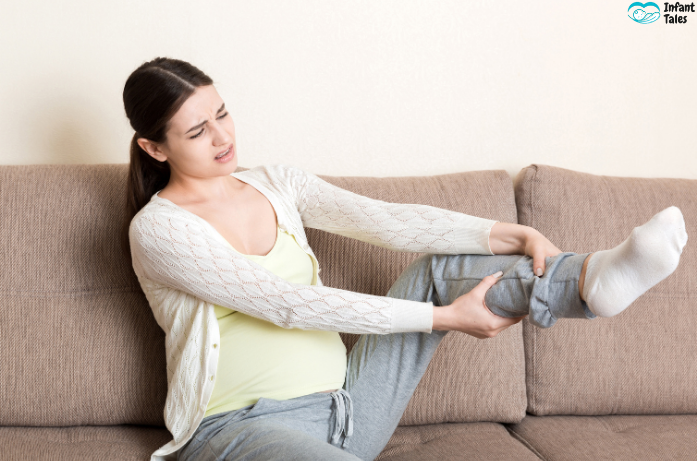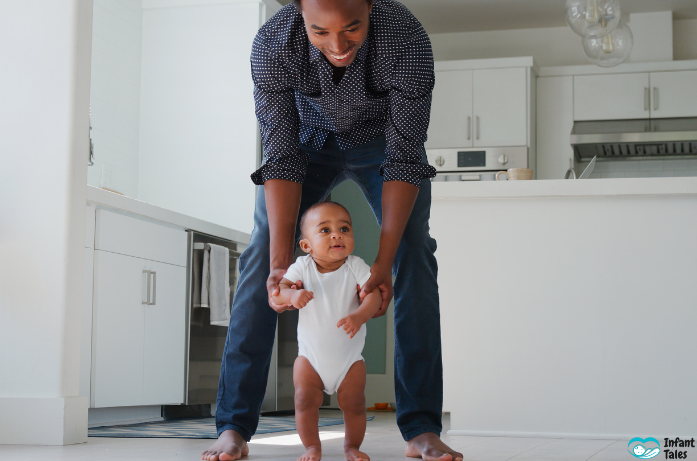By a Caring Mom at Infant Tales
If you’re pregnant and struggling to get good sleep, you’re not alone. If you’re pregnant and struggling to get good sleep, you’re not alone. Pregnancy is full of surprises, and body transformation is one of the most beautiful changes, but on the other hand, falling asleep every night can be a challenge by the end of pregnancy. With a growing belly, frequent bathroom visits, back pain, and emotional turmoil, it’s not uncommon for women to stay up until 2 a.m. scrolling through “How to get better sleep in pregnancy?”
The truth is, good sleep during pregnancy plays a crucial role not only in rest, but also in the baby’s development and the mother’s recovery. Good sleep helps regulate hormones, balance mood, and boost immunity. So, here is the way we are going to tackle this, first we will discuss the factors contributing to pregnancy sleep troubles, then the best pregnancy sleeping positions, and finally the natural ways of sleeping better while pregnant that are safe for the baby, all this so that you wake up refreshed, peaceful, and ready for the day.
Why Sleep Matters So Much During Pregnancy
During pregnancy, your body works harder than ever. Sleep gives it time to restore and rejuvenate. Sleeping enough means the following benefits for you:
- Support baby brain development and healthy growth
- Recruiting your immune system and heart health
- Improving blood flow to your uterus and placenta
- Better controlling your stress, anxiety and hormonal fluctuations
- Reduce the risk of gestational diabetes and high blood pressure
The National Sleep Foundation states that women during pregnancy need quality sleep of 7-9 hours every night. Unfortunately, insomnia or sleep disturbances affect about 75% of pregnant women, particularly in the third trimester.
Common Sleep Problems During Pregnancy
So, if you fall asleep quickly and still feel tired, let’s look at some common causes of sleep disturbance in pregnant women: According to MedlinePlus, a trusted resource from the U.S. National Library of Medicine, many pregnant women experience disrupted sleep due to hormonal and physical changes.
1. Going to the Toilet Often: The expanding uterus is placing pressure on the bladder, particularly during the last trimester, which is leading to multiple wake-ups at night.
2. Back and Hip Pain: Changes in hormones are making ligaments and joints more relaxed which in turn is causing more difficulty in finding a comfortable sleeping position.
3. Heartburn and Indigestion: Pregnancy hormones relax your digestive muscle tone, creating a backflow of acid, particularly after eating.
4. Restless Legs Syndrome (RLS): Uncomfortable buzzing or pulsing in the legs can make you lose sleep.
5. Anxiety and Vivid Dreams: Hormonal shifts and emotional anticipation can lead to overthinking, worry, or strange dreams.
6. Breathing Difficulties: The expanding of your womb is the reason for the pushing of the diaphragm upwards, which will lead to shallow breathing, and lying flat for sleeping will be torturous.
Knowing these problems, you will be able to take the right steps moving towards and getting safe and effective sleep solutions during pregnancy.

Best Sleeping Positions for Pregnancy
Finding the right sleep position during pregnancy can change your rest positively. According to the American Pregnancy Association, adopting proper sleeping postures not only improves comfort but also supports healthy blood flow and reduces back strain.
1. Left-Side Sleeping (SOS – Sleep on Side)
Sleeping on your left side is the most recommended position during pregnancy by doctors. This position increases the blood supply to your baby, kidneys, and uterus while at the same time not putting pressure on your liver.
Tips:
- A pillow placed in between your knees helps to keep your hips aligned and back pain relieved.
- Use a pregnancy pillow to support your belly and lower back.
2. Semi-Reclined Position for Heartburn Relief
If you are suffering from acid reflux, then use two or three pillows to support your upper body. This posture prevents stomach acid from going up and thus facilitates breathing.
3. Right Side Sleeping (Occasionally)
Even though the left side is the best side, sleeping on your right sometimes is acceptable. Just do not lie flat for a long time.
4. Avoid Sleeping on Your Back
By the second trimester, sleeping on your back can cause dizziness and backaches. It compresses the inferior vena cava, a major vein that returns blood to your heart, reducing circulation to your baby.
Natural Ways to Get Better Sleep in Pregnancy
Improving sleep quality during pregnancy does not have to involve medication, just practice of a few simple and careful habits.
1. Create a Relaxing Bedtime Routine
- Indulge in a warm (not hot) bath or shower.
- Try light stretches or prenatal yoga.
- Listen to relaxing birds chirping or guided meditations.
- Enjoy a relaxing book or pregnancy journal before going to bed.
- Avoid bright screens at least 30 minutes before sleep.
Building up a fixed bedtime routine during pregnancy tells the body that it is time to sleep.
2. Watch Your Diet and Hydration
- Don’t eat heavy, spicy or fatty meals close to bedtime; they will aggravate heartburn.
- Drink water all day long, but stop drinking two hours before going to bed.
- Have a light snack like warm milk, yogurt or banana to avoid hummies.
3. Move Your Body Safely
Daily exercises that are safe for pregnancy enhance blood flow and also help to alleviate any aches and pain. You can take a walk in the evening or stretch as a way to unwind naturally. (Always consult your doctor before starting new exercises.)
4. Keep the Room Cool and Dark
A pleasant, silent atmosphere allows the body to sleep deeply.
- Use breathable cotton sheets.
- Keep the temperature around 22–24°C (71–75°F).
- Try a white noise machine or a gentle fan.
5. Work on Mindfulness and Relaxation
Pregnancy comes with emotional ups and downs. Calm your mind before bed through:
- Deep breathing (inhale 4 seconds, exhale 6 seconds)
- Visualization or gratitude journaling
- Gentle self-massage or meditation apps designed for pregnancy
Natural Sleep Aids and Comfort Tools
Some simple tools can make your nights much more comfortable:
- Pregnancy body pillow: Gives back, tummy and knee support, perfect for sleeping on your side.
- Humidifier: A solution to nasal congestion that commonly occurs during late pregnancy.
- Supportive mattress topper: Reduces pressure on hips and spine.
- Loose, breathable sleepwear: Soft cotton or bamboo fabric can be chosen for better airflow.
Managing Stress and Pregnancy Anxiety
Many moms find that even when their body feels tired, their mind stays busy. Pregnancy-related anxiety is real, whether it’s about labor, parenting, or health.
Here are tips on how to still your mind before sleep:
- Talk it out: Share your feelings with your partner or a trusted friend.
- Limit social media: Unending scrolling can heighten anxiety and cause overstimulation.
- Focus on gratitude: End your day by thinking of three positive moments or things you’re thankful for.
To get Good sleep, first the mind has to be at peace, your emotional state directly affects the quality of your sleep.
When to Talk to Your Doctor
If you are experiencing sleep issues that are not going away, bring them up during your prenatal check-ups. Always get guidance when you:
- Have anxious insomnia that lasts for more than two weeks
- Make loud snoring sounds or briefly stop breathing (possible sleep apnea)
- Feel restless legs or painful cramps every night
- Suffer from chronic fatigue during the day
Your doctor may recommend safe behavioral therapies, iron supplements (for RLS), or specific lifestyle adjustments.
For further reading, it is possible to get evidence-based sleep information from reliable health websites like the National Sleep Foundation and American College of Obstetricians and Gynecologists.

The Role of Your Partner in pregnancy
Pregnancy can be exhausting, and partner support makes a world of difference. A partner can:
- Help you adjust pillows or set up your sleep space
- Giving a light back or leg massage
- Participate in night routines such as reading together or making herbal tea
Pregnancy is teamwork, so, better sleep for you means serene happy home for both of you.
Final Thoughts
Pregnancy is a magical time, but also one that tests your patience, energy and sleep schedule. Remember, the period of sleepless nights is not endless. You could have good sleep naturally during pregnancy with the help of supportive changes, supportive persons, and good sleeping positions.
Sleep is not luxury for expecting moms, its essential self-care. When you rest well. You are not only feeding yourself but also the baby is getting the healthiest starter through your good sleep. So tonight, take that deep breath, snuggle into your pillow, and remind yourself, you deserve this rest.
FAQs About Sleep During Pregnancy
1. Why do I struggle to sleep during pregnancy?
Hormonal changes, backache, anxiety, and going to the bathroom frequently are some of the reasons pregnant women find it hard to sleep soundly.
2. What is the most recommended sleeping position for pregnant women?
Sleeping on your left side improves blood flow and reduces pressure on organs and veins.
3. Can I use a pregnancy pillow every night?
Of course! Pregnancy pillows offer support to your belly and back, thus side-sleeping becomes much more comfortable.
4. Are naps safe during pregnancy?
Yes, short naps (20–30 minutes) can boost energy and mood, especially if nighttime sleep is disturbed.
5. Is lack of sleep harmful to my baby?
Occasional insomnia is normal, but chronic sleep deprivation may affect your immunity and increase stress. Prioritize rest and consult your doctor if needed.
Disclaimer: The information provided in this article is educational only and is not a substitute for professional medical advice. Always consult your healthcare provider before making significant lifestyle or sleep-related changes during pregnancy.
For more caring advice on infant growth, parenting, and early motherhood, visit us at Infant Tales, your gentle guide through pregnancy to parenting.



